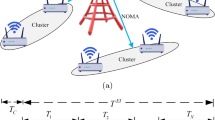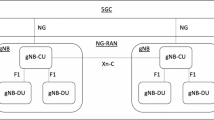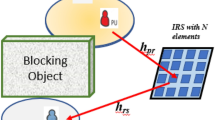Abstract
This article investigates the impact of choosing a specific quality of service constraint on the performance of the cognitive users in a spectrum sharing cognitive environment. To communicate over a wireless channel reserved to a primary user, the cognitive user has to satisfy the primary user’s quality of service constraint. Cognitive systems under interference temperature and outage probability constraints are investigated in this work. The outage probability of the primary user in an interference temperature-constraint environment is analyzed, and the performance measures of the cognitive users are developed. A comparative study of the cognitive user’s performance under equivalent outage probability and interference temperature constraints is conducted as well. Numerical results are presented to verify the theoretical analysis and compare the performance measures under these constraints. Results of this work illustrate the effects of the communication environment parameters on the cognitive users and detail the performance differences between the equivalent outage probability-constraint and interference temperature-constraint cognitive systems.
Similar content being viewed by others
References
Federal Communications Commission. (2002). Spectrum policy task force report. ET docket no. 02-135.
Mitola, J. (2000). Cognitive radio: An integrated agent architecture for software defined radio. PhD thesis, Stockholm : Royal Institute of Technology (KTH).
Haykin S. (2005) Cognitive radio: Brain-empowered wireless communications. IEEE Journal on Selected Areas in Communications 23: 201–220
Kim, S. (2011). Cognitive radio bandwidth sharing scheme based on the two-way matching game. Wireless Personal Communications, 1–13. doi:10.1007/s11277-011-0488-z (Published Online).
da Costa, D., Aïssa, S., & Cavalcante, C. (2012). Performance analysis of partial relay selection in cooperative spectrum sharing systems. Wireless Personal Communications, 1–14. doi:10.1007/s11277-012-0518-5 (Published Online).
Su H., Zhang X. (2008) Cross-layer based opportunistic MAC protocols for QoS provisionings over cognitive radio wireless networks. IEEE Journal on Selected Areas in Communications 26: 118–129
Su, H., & Zhang, X. (2009). Adaptive uplink MAC for CDMA-based cognitive radio networks. In IEEE military communications conference (MILCOM) (pp. 1–7).
Du, Q., & Zhang, X. (2010). Queue-aware spectrum sensing for interference-constrained transmissions in cognitive radio networks. In IEEE International Conference on Communications (ICC) (pp. 1–5).
Wang L.-C., Wang C.-W., Adachi F. (2011) Load-balancing spectrum decision for cognitive radio networks. IEEE Journal on Selected Areas in Communications 29: 757–769
El-Sherif A. A., Liu K. J. R. (2011) Joint design of spectrum sensing and channel access in cognitive radio networks. IEEE Transactions on Wireless Communications 10: 1743–1753
Ciftci, S., & Torlak, M. (2012). A comparison of energy detectability models for cognitive radios in fading environments. Wireless Personal Communications, 1–22. doi:10.1007/s11277-011-0468-3 (Published Online).
Ghasemi A., Sousa E. S. (2007) Fundamental limits of spectrum-sharing in fading environments. IEEE Transactions on Wireless Communications 6(2): 649–658
Le, H. S. T., & Liang, Q. (2007). An efficient power control scheme for cognitive radios. In IEEE Wireless Communications and Networking Conference (WCNC) (pp. 2559–2563).
Hamdi, K., Zhang, W., & Letaief, K. B. (2007). Power control in cognitive radio systems based on spectrum sensing side information. In IEEE International Conference on Communications (ICC) (pp. 5161–5165).
Zhang, R., Cui, S., & Liang, Y.-C. (2008). On ergodic sum capacity of fading cognitive multiple-access channel. In Forty-sixth annual allerton conference (pp. 879–886).
Ekin, S., Yilmaz, F., Celebi, H., Qaraqe, K., Alouini, M.-S., & Serpedin, E. (2009). Achievable capacity of a spectrum sharing system over hyper fading channels. In IEEE Global Communications Conference (GLOBECOM).
Ban T. W., Choi W., Jung B. C., Sung D. K. (2009) Multi-user diversity in a spectrum sharing system. IEEE Transactions on Wireless Communications 8: 102–106
Zhang R., Liang Y.-C. (2010) Investigation on multiuser diversity in spectrum sharing based cognitive radio networks. IEEE Communications Letters 14(2): 133–135
Suraweera H. A., Smith P. J., Shafi M. (2010) Capacity limits and performance analysis of cognitive radio with imperfect channel knowledge. IEEE Transactions on Vehicular Technology 59(4): 1811–1822
Li D. (2011) Efficient power allocation for multiuser cognitive radio networks. Wireless Personal Communications 59: 589–597
Kang, X., Zhang, R., Liang, Y.-C., & Garg, H. K. (2009). Optimal power allocation for cognitive radio under primary user’s outage loss constraint. In IEEE International Conference on Communications (ICC) (pp. 1–5).
Li D. (2010) Performance analysis of uplink cognitive cellular networks with opportunistic scheduling. IEEE Communications Letters 14: 827–829
Farraj, A. K., Miller, S. L., & Qaraqe, K. A. (2011). Queue performance measures for cognitive radios in spectrum sharing systems. In IEEE international workshop on recent advances in cognitive communications and networking (RACCN)—global telecommunications conference (GLOBECOM) workshop (pp. 997–1001).
Farraj, A. K., & Hammad, E. M. Performance of primary users in spectrum sharing cognitive radio environment. Wireless Personal Communications, 1–11. doi:10.1007/s11277-011-0469-2 (Published Online).
Goldsmith A. (2005) Wireless communications, 1 edn. Cambridge University Press, Cambridge
Sklar B. (1988) Digital communications: Fundamentals and applications, 1 edn. Prentice Hall, Englewood Cliffs
Cover T. M., Thomas J. A. (1991) Elements of information theory, 1 edn. Wiley, New York
Author information
Authors and Affiliations
Corresponding author
Rights and permissions
About this article
Cite this article
Farraj, A.K., Hammad, E.M. Impact of Quality of Service Constraints on the Performance of Spectrum Sharing Cognitive Users. Wireless Pers Commun 69, 673–688 (2013). https://doi.org/10.1007/s11277-012-0606-6
Published:
Issue Date:
DOI: https://doi.org/10.1007/s11277-012-0606-6




